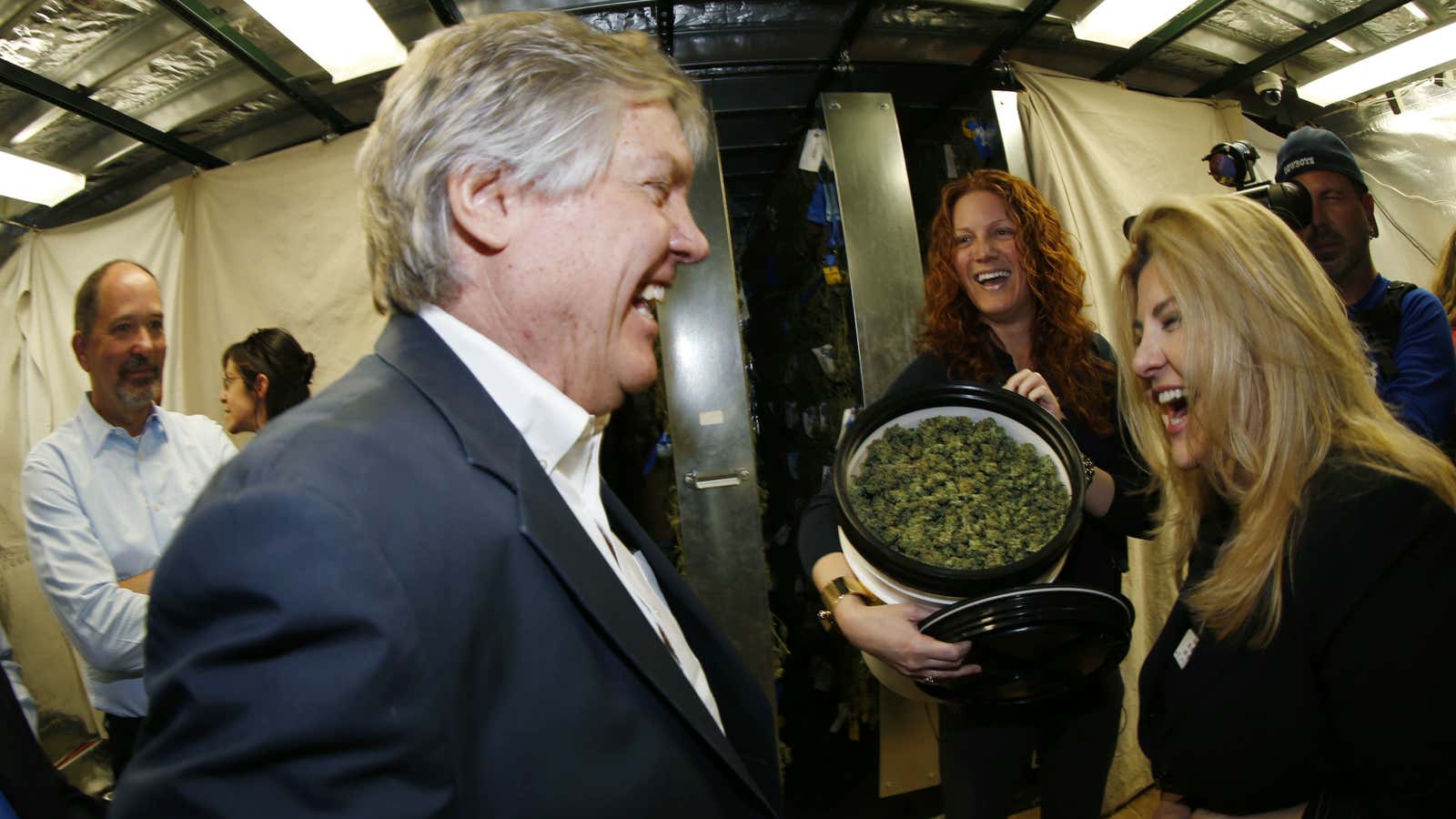Of all the distinguished Democrats roaming the halls of Philadelphia’s Wells Fargo Center this week, Tick Segerblom is the only one who can boast a strain of commercial marijuana that bears his name. Developed by a Nevada grower, the Segerblom Haze gives a peppy but powerful high that’s heavy on the THC. It seemed fitting given how “potent” Segerblom, a state senator from Las Vegas, has been on pushing for marijuana legalization, says the dispensary that sells it.
Segerblom is definitely a weed enthusiast. But he still can’t smoke his eponymous haze in his own state. Though the bill he championed in 2013 made medical marijuana dispensaries legal throughout Nevada, he doesn’t have a prescription card—which means he has to go to Colorado to get high.
Instate toking looks to be in the works, though. This November, a ballot measure—sponsored by, you guessed it, Segerblom—will let Nevada voters choose to legalize recreational weed use for adults. The latest polling, from 2015, suggests 56% of Nevada voters support it.
And Nevada’s not alone. Its ballot measure is one of slew of developments that promise to make 2016 a pivotal year for pot.
Though it drew little attention from the media, the Democratic Party platform (pdf) now endorses a ”reasoned pathway to marijuana legalization,” one of the many bold changes inspired by the Bernie Sanders contingent. Along with Nevadans, voters in Maine, California, Massachusetts, and possibly a slew of other states will decide in November whether adults can use weed recreationally, letting governments regulate and tax the industry the way they do alcohol. (Right now, it’s legal in Colorado, Washington, Alaska, Oregon, and Washington, DC.) And a handful of other states will be considering legalizing medical marijuana.
It’s no coincidence that this push coincides with Sanders’ unexpected success, says Segerblom. The Vermont senator’s progressive stances resonate with a disproportionately high share of young voters, including his position on pot. In fact, Sanders is the first major Democratic presidential candidate to back legal recreational use.
“It’s a sign of the rise of millennials—that’s what’s really driving it,” says Segerblom, who is attending the Democratic national convention this week as a delegate for Sanders. In state after state, the political opposition to legal weed that many assume will materialize simply hasn’t.
Part of Segerblom’s commitment to making weed legal is moral. When he worked for the Jimmy Carter administration in the late 1970s, smoking marijuana was a “pretty normal thing,” he says. Since Ronald Reagan won the White House, however, he watched in dismay as the government made it a criminal offense. That approach didn’t help society—or, for that matter, stamp out marijuana use.
Letting the government oversee the legal trade creates a huge new source of tax revenue and lets the government enforce marijuana safety standards.
“It’s already there,” says Segerblom. “Why not tax it, test it, and regulate it?”
This logic is even more compelling in a state whose booming casino and entertainment business helps draw some 42 million tourists a year. Since Nevada’s dispensary policy went into effect only last year, it’s hard to tell how much it’s bringing in, but conservative estimates put it at $100 million annually. The fact that it recognizes other states’ medical marijuana prescriptions—something few other states do—is a huge boon. Legalizing recreational use among adults will, of course, be far bigger. A recent study estimated that if the ballot measure passes, Nevada will bring in more than $600 million a year in marijuana sales by 2020.
Of course, beyond the moral and economic rationales, there’s also just the obvious reason to let adults get high when they want. “I don’t care why you want to do it,” says Segerblom. “I just think it’s fun.”
